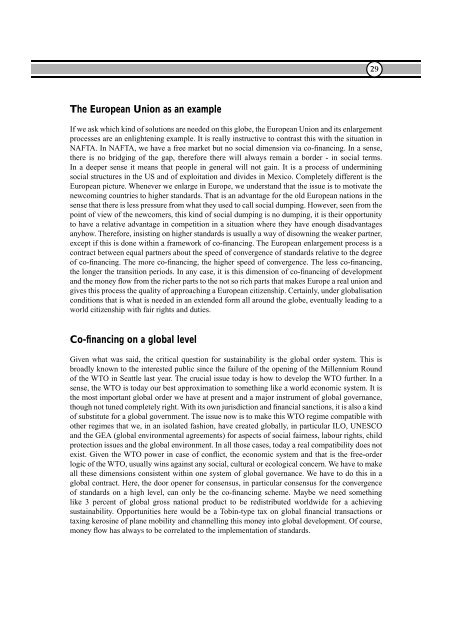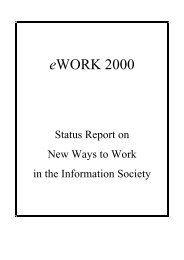Proceedings of 8th European Assembly on telework (Telework2001)
Proceedings of 8th European Assembly on telework (Telework2001)
Proceedings of 8th European Assembly on telework (Telework2001)
Create successful ePaper yourself
Turn your PDF publications into a flip-book with our unique Google optimized e-Paper software.
29The <str<strong>on</strong>g>European</str<strong>on</strong>g> Uni<strong>on</strong> as an exampleIf we ask which kind <str<strong>on</strong>g>of</str<strong>on</strong>g> soluti<strong>on</strong>s are needed <strong>on</strong> this globe, the <str<strong>on</strong>g>European</str<strong>on</strong>g> Uni<strong>on</strong> and its enlargementprocesses are an enlightening example. It is really instructive to c<strong>on</strong>trast this with the situati<strong>on</strong> inNAFTA. In NAFTA, we have a free market but no social dimensi<strong>on</strong> via co-financing. In a sense,there is no bridging <str<strong>on</strong>g>of</str<strong>on</strong>g> the gap, therefore there will always remain a border - in social terms.In a deeper sense it means that people in general will not gain. It is a process <str<strong>on</strong>g>of</str<strong>on</strong>g> underminingsocial structures in the US and <str<strong>on</strong>g>of</str<strong>on</strong>g> exploitati<strong>on</strong> and divides in Mexico. Completely different is the<str<strong>on</strong>g>European</str<strong>on</strong>g> picture. Whenever we enlarge in Europe, we understand that the issue is to motivate thenewcoming countries to higher standards. That is an advantage for the old <str<strong>on</strong>g>European</str<strong>on</strong>g> nati<strong>on</strong>s in thesense that there is less pressure from what they used to call social dumping. However, seen from thepoint <str<strong>on</strong>g>of</str<strong>on</strong>g> view <str<strong>on</strong>g>of</str<strong>on</strong>g> the newcomers, this kind <str<strong>on</strong>g>of</str<strong>on</strong>g> social dumping is no dumping, it is their opportunityto have a relative advantage in competiti<strong>on</strong> in a situati<strong>on</strong> where they have enough disadvantagesanyhow. Therefore, insisting <strong>on</strong> higher standards is usually a way <str<strong>on</strong>g>of</str<strong>on</strong>g> disowning the weaker partner,except if this is d<strong>on</strong>e within a framework <str<strong>on</strong>g>of</str<strong>on</strong>g> co-financing. The <str<strong>on</strong>g>European</str<strong>on</strong>g> enlargement process is ac<strong>on</strong>tract between equal partners about the speed <str<strong>on</strong>g>of</str<strong>on</strong>g> c<strong>on</strong>vergence <str<strong>on</strong>g>of</str<strong>on</strong>g> standards relative to the degree<str<strong>on</strong>g>of</str<strong>on</strong>g> co-financing. The more co-financing, the higher speed <str<strong>on</strong>g>of</str<strong>on</strong>g> c<strong>on</strong>vergence. The less co-financing,the l<strong>on</strong>ger the transiti<strong>on</strong> periods. In any case, it is this dimensi<strong>on</strong> <str<strong>on</strong>g>of</str<strong>on</strong>g> co-financing <str<strong>on</strong>g>of</str<strong>on</strong>g> developmentand the m<strong>on</strong>ey flow from the richer parts to the not so rich parts that makes Europe a real uni<strong>on</strong> andgives this process the quality <str<strong>on</strong>g>of</str<strong>on</strong>g> approaching a <str<strong>on</strong>g>European</str<strong>on</strong>g> citizenship. Certainly, under globalisati<strong>on</strong>c<strong>on</strong>diti<strong>on</strong>s that is what is needed in an extended form all around the globe, eventually leading to aworld citizenship with fair rights and duties.Co-fi nancing <strong>on</strong> a global levelGiven what was said, the critical questi<strong>on</strong> for sustainability is the global order system. This isbroadly known to the interested public since the failure <str<strong>on</strong>g>of</str<strong>on</strong>g> the opening <str<strong>on</strong>g>of</str<strong>on</strong>g> the Millennium Round<str<strong>on</strong>g>of</str<strong>on</strong>g> the WTO in Seattle last year. The crucial issue today is how to develop the WTO further. In asense, the WTO is today our best approximati<strong>on</strong> to something like a world ec<strong>on</strong>omic system. It isthe most important global order we have at present and a major instrument <str<strong>on</strong>g>of</str<strong>on</strong>g> global governance,though not tuned completely right. With its own jurisdicti<strong>on</strong> and financial sancti<strong>on</strong>s, it is also a kind<str<strong>on</strong>g>of</str<strong>on</strong>g> substitute for a global government. The issue now is to make this WTO regime compatible withother regimes that we, in an isolated fashi<strong>on</strong>, have created globally, in particular ILO, UNESCOand the GEA (global envir<strong>on</strong>mental agreements) for aspects <str<strong>on</strong>g>of</str<strong>on</strong>g> social fairness, labour rights, childprotecti<strong>on</strong> issues and the global envir<strong>on</strong>ment. In all those cases, today a real compatibility does notexist. Given the WTO power in case <str<strong>on</strong>g>of</str<strong>on</strong>g> c<strong>on</strong>flict, the ec<strong>on</strong>omic system and that is the free-orderlogic <str<strong>on</strong>g>of</str<strong>on</strong>g> the WTO, usually wins against any social, cultural or ecological c<strong>on</strong>cern. We have to makeall these dimensi<strong>on</strong>s c<strong>on</strong>sistent within <strong>on</strong>e system <str<strong>on</strong>g>of</str<strong>on</strong>g> global governance. We have to do this in aglobal c<strong>on</strong>tract. Here, the door opener for c<strong>on</strong>sensus, in particular c<strong>on</strong>sensus for the c<strong>on</strong>vergence<str<strong>on</strong>g>of</str<strong>on</strong>g> standards <strong>on</strong> a high level, can <strong>on</strong>ly be the co-financing scheme. Maybe we need somethinglike 3 percent <str<strong>on</strong>g>of</str<strong>on</strong>g> global gross nati<strong>on</strong>al product to be redistributed worldwide for a achievingsustainability. Opportunities here would be a Tobin-type tax <strong>on</strong> global financial transacti<strong>on</strong>s ortaxing kerosine <str<strong>on</strong>g>of</str<strong>on</strong>g> plane mobility and channelling this m<strong>on</strong>ey into global development. Of course,m<strong>on</strong>ey flow has always to be correlated to the implementati<strong>on</strong> <str<strong>on</strong>g>of</str<strong>on</strong>g> standards.








